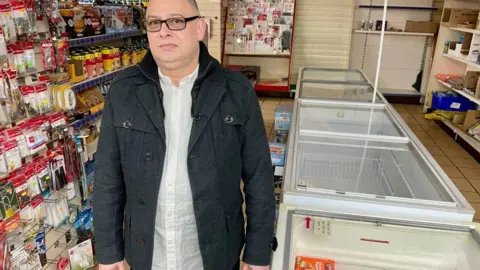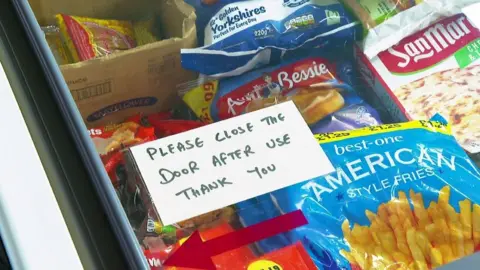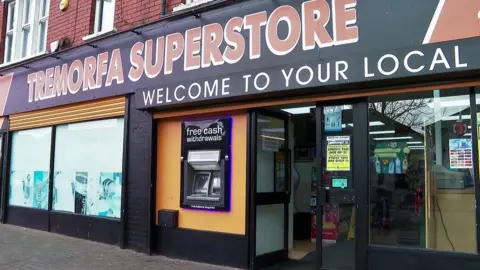Cardiff shop's energy bill up from £900 to £4,700
 BBC
BBCChancellor Jeremy Hunt has "no idea how bad things are" for businesses, a shop owner facing closure has said.
Ruhail Shahzad, who runs Tremorfa Superstore in Cardiff, said his monthly electricity bill had risen from £900 to about £4,700.
The organisation representing independent shops said it should be easier for businesses to leave expensive energy contracts.
The UK government said it would "always be on the side of businesses".
Mr Shahzad has run the store for four years and lives above it with his family.
His energy bills have increased since his previous contract came to an end last summer, and he had turned off lights and emptied freezers to try to save electricity.
Mr Shahzad said his gas bills had also increased substantially from about £150 to almost £800 a month.

"It's not affordable," he said. "At prices like this, I can't see myself staying here much longer."
Emptying and turning off freezers has resulted in only small savings which barely dent the increased bills from his supplier.
The shop has also experienced a drop in the number of customers, while those who do come are spending less.
Mr Shahzad said he wanted Mr Hunt to use the Spring Budget on Wednesday to extend support with business energy bills.
"With the Budget coming, please help all businesses… to keep going. That is the biggest thing I could ask the chancellor to do."
'Look at all the struggling businesses'
He asked Mr Hunt to introduce further support to help businesses with their energy costs.
"Please reconsider, and look at all the businesses that are struggling, because you have no idea how bad things are."
Some 23,000 people in Wales are employed by convenience stores, with the sector contributing over £600m to the economy, according to the Association of Convenience Stores.

Nia Morris owns Siop y Pentre, the village store in Cilgerran, Pembrokeshire, and during her 10 years it has expanded to offer Post Office services, locally sourced products and refillable supplies.
"An important factor in getting a small business like this to survive is to get as many people through the door as possible," Ms Morris said. "You can't stay in business by simply relying on local people popping in for bread and milk."
The shop has diversified in order to survive. It has also avoided high energy costs by securing a new deal before prices spiked.
However, any further rises in energy costs would prompt difficult decisions.
'I worry a lot more'
"We have been checking if it's quieter at night, and whether we should be closing earlier. It would mean a couple of hours where we wouldn't need to be paying staff or keeping the lights on.
"But it hasn't come to that yet. I am keeping my eye on the situation," Ms Morris added.
"It's difficult, I worry a lot more, and I worry about the future if things don't change," she said. "If energy costs go up and up, I don't know what we would do," she said.

Another business group, the British Independent Retailers Association, wants the UK government to make it easier for customers to withdraw from expensive energy contracts.
Andrew Goodacre, chief executive of BIRA, said businesses should be allowed to exit contracts that were signed during "the chaos of last year" when energy prices were at their peak.
"Many businesses were forced to sign contracts at very high levels of energy cost," he said.
"Now, the wholesale price of energy is now below levels that we saw pre-Ukraine war, so the wholesale prices have fallen dramatically.
"But unless the government intervenes and allows those businesses who signed last year to renegotiate at lower levels, then those businesses will continue to find it really difficult to survive over the next twelve to fifteen months," said Mr Goodacre.
The UK government said: "While no national government can control the global factors pushing up the price of energy and other business costs, we will always be on the side of businesses.
"That's why we provided them and other non-domestic energy users with an unprecedented package of support, enabling some businesses to pay around half of predicted wholesale energy costs this winter, and we've pledged further energy support from April onwards."

- X-RAY: The team are back, fighting for your rights!
- THE BESTEST BITS: A little bit more of what you like from Wynne Evans

